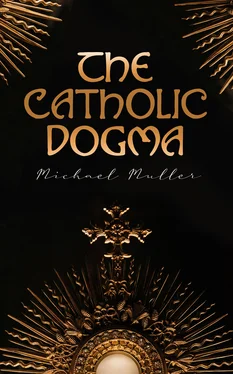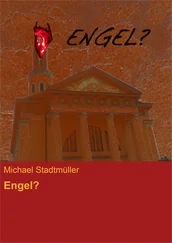Michael Müller - The Catholic Dogma
Здесь есть возможность читать онлайн «Michael Müller - The Catholic Dogma» — ознакомительный отрывок электронной книги совершенно бесплатно, а после прочтения отрывка купить полную версию. В некоторых случаях можно слушать аудио, скачать через торрент в формате fb2 и присутствует краткое содержание. Жанр: unrecognised, на английском языке. Описание произведения, (предисловие) а так же отзывы посетителей доступны на портале библиотеки ЛибКат.
- Название:The Catholic Dogma
- Автор:
- Жанр:
- Год:неизвестен
- ISBN:нет данных
- Рейтинг книги:4 / 5. Голосов: 1
-
Избранное:Добавить в избранное
- Отзывы:
-
Ваша оценка:
- 80
- 1
- 2
- 3
- 4
- 5
The Catholic Dogma: краткое содержание, описание и аннотация
Предлагаем к чтению аннотацию, описание, краткое содержание или предисловие (зависит от того, что написал сам автор книги «The Catholic Dogma»). Если вы не нашли необходимую информацию о книге — напишите в комментариях, мы постараемся отыскать её.
The Catholic Dogma — читать онлайн ознакомительный отрывок
Ниже представлен текст книги, разбитый по страницам. Система сохранения места последней прочитанной страницы, позволяет с удобством читать онлайн бесплатно книгу «The Catholic Dogma», без необходимости каждый раз заново искать на чём Вы остановились. Поставьте закладку, и сможете в любой момент перейти на страницу, на которой закончили чтение.
Интервал:
Закладка:
Table of Contents
The story is told of a Western-bound train, flying along with lightning speed; the time was shortly after sunset. Suddenly a crash was heard: the train stopped. "What is the matter?" the passengers asked one another. A huge owl, dazzled by the glare, had struck against the reflector in front of the engine, shivered the glass, and tried to extinguish the light, and a great bull had set its head against the engine, to stop the train. The lamp was rekindled, the engine sped on, but the stupid owl and the obstinate bull were cast aside, dead, and left to rot and be devoured by wild beasts. An Irishman, on seeing them, exclaimed: "I admire your courage, but condemn your judgment."
This train may be likened to the holy Catholic Church, speeding on, on her heaven-sent mission, to lead men to heaven by the light of her holy doctrine. The foolish owl, the enemy of light and the friend of darkness, represents Lucifer, who, as the foe of God and of the light of God's holy religion, has always been endeavoring to extinguish the light of the true religion. The bull represents the kings and emperors, the heretics and members of secret societies, whom Lucifer uses to stop, if possible, the progress of the Catholic Church, the bearer of the light of faith. Although it is hard, in a certain sense, not to admire the courage of Lucifer's agents, yet we cannot but condemn their judgment, their folly, and wickedness, in opposing the work of God, and bringing down upon themselves the everlasting curse of the Almighty.
Our Divine Saviour, Jesus Christ, came to break the power of the devil over mankind; he came to banish idolatry, the worship of the devil, from among men, and lead them back to the worship and service of his heavenly Father by his holy example and divine doctrine. But no sooner had he begun to teach men his saving doctrine, than Satan opposed him. Satan is called, in Holy Scripture, the father of lies. From the beginning of the world he has tried to misrepresent every religious truth. He practised this black art in paradise; and so unhappily successful was he in it, that ever since he has practised it, in order to propagate error and vice among men. When our Saviour began to preach his holy religion, Satan practised his black art, even in the presence of Christ himself. By malicious men, the ministers of Satan, Christ was contradicted and misrepresented in his doctrine; for, instead of being believed, he was held up to the people as a blasphemer, for teaching that he was the Son of God, as the impious Caiphas declared him to be, saying, "He hath blasphemed, he is guilty of death." (Matt. xxvi. 65.) He was misrepresented in his reputation; for he was noble, of royal lineage, and yet was despised: "Is not this the carpenter's son?" (Matt. xiii. 55.) He is wisdom itself, and was represented as an ignorant man: "How doth this man know letters, having never learned?" (John vii. 17.) He was represented as a false prophet: "And they blindfolded him, and smote his face … saying: Prophesy who is this that struck thee ?" (Luke, xxii. 64.) He was represented as a madman: "He is mad, why hear you him?" (John, x. 20.) He was represented as a winebibber, a glutton, and a friend of sinners: "Behold a man that is a glutton and a drinker of wine, a friend of publicans and sinners." (Luke, vii. 34.) He was represented as a sorcerer: "By the prince of the devils he casteth out devils." (Matt. ix. 34.) He was represented as a heretic and possessed person: "Do we not say well of thee, that thou art a Samaritan, and hast a devil?" (John, viii. 48.) In a word, Jesus was represented to the people as so bad and notorious a man, that no trial was deemed necessary to condemn him, as the Jews said to Pilate: "If be were not a malefactor, we would not have delivered him up to thee." (John, xviii. 30.) If ever infamous calumny was carried to excess, it was undoubtedly in the case of our Saviour, "who knew not sin," who had never uttered a deceitful Word, who "did all things well," and who "passed his life in doing good, and healing all kinds of infirmities." Christ's holy doctrine and his holy Church, the teacher of his divine doctrines, are still misrepresented by Lucifer's agents, now that he is on his throne, gloriously reigning in heaven.
Our divine Saviour and his holy Apostles spoke of these agents and warned the Christians to be on their guard against them. That the Protestant Bishop Coxe is one of them is a well-known fact. In several passages of Holy Scripture he is spoken of. We give some of them for his benefit: -
1 Our blessed Saviour, foretelling the coming of false teachers, says, "Beware of false prophets, who come to you in sheep's clothing, but inwardly they are ravenous wolves; by their fruits ye shall know them;" and then he tells us, going on with the similitude of a tree, what shall be the portion of such false prophets. " Every tree that bringeth not forth good fruit shall be cut down and cast into the fire." (Matt. vii. 15, 19.) Such is the fate of false teachers, according to Jesus Christ. St. Paul describes them in the same light, and exhorts the pastors of the Church to watch against them, that they may prevent the seduction of the flock. "I know that after my departure ravening wolves shall enter in among you, not sparing the flock: and of your own selves shall arise men speaking perverse things, to draw away disciples after them; therefore watch." (Acts, xx. 29.) Such is the idea the word of God gives of all who depart from the doctrine of the Church of Christ and teach falsehood; they are ravenous wolves, seducers of the people, who speak perverse things, and whose end is hel!fire.
2 St. Paul, concluding his Epistle to the Romans, warns them against such teachers in these words: "Now, I beseech you, brethren, to mark them who cause dissensions and offences contrary to the doctrine which ye have learned, and to avoid them: for they that are such serve not Christ our Lord, but their own. belly, and by pleasing speeches and good words seduce the hearts of the innocent." (Rom. xvi. 17.) Can such as these, who cause dissensions contrary to the ancient doctrine, and seduce the souls redeemed by the blood of Jesus, who are not servants of Christ, but his enemies, and are slaves to their own belly - can these, I say, be in the way of salvation? Alas! the same holy Apostle describes their fate in another text, "That they are enemies of the cross of Christ, whose end is destruction, whose god is their belly, and whose glory is in their shame." (Philip. iii. 18.)
3 In St. Paul's absence some false teachers had come in, among the Galatians, and persuaded them that it was necessary for salvation to join circumcision with the gospel; on this account the apostle writes his epistle to correct this error; and though it was but an error on one point, and apparently not of great importance, yet, because it was false doctrine, the holy Apostle condemns it: "I wonder how you are so soon removed from him that called you to the grace of Christ, unto another gospel: which is not another; only there are some that trouble you, and would pervert the gospel of Christ. But though we, or an angel from heaven, preach a gospel to you besides that which we have preached to you, let him be accursed. As we said before, I say now again, if any one preach to you a gospel besides that which ye have received, let him be accursed." (Gal. i. 6.) This shows, indeed, the crime and fate of false teachers, though their doctrine was false only on a single point.
4 St. Peter describes these unhappy men in the most dreadful colors. "There shall be among you lying teachers, who shall bring sects of perdition " (or, as the Protestant translation has it, damnable heresies) "and deny the Lord who bought them, bringing on themselves swift destruction." (II. Pet. ii. 1.) and going on to describe them, he says: "Their judgment of a long time lingereth not, and. Their destruction slumbereth not." (ver. 3.) "The Lord knoweth how: ..to reserve the unjust unto the day of judgment to be tormented; and especially them who … despise governments, audacious, pleasing themselves, they fear not to bring in sects blaspheming," (ver. 9.) "leaving the right way, they have gone astray." (ver. 15. "These are wells without water, and clouds tossed with whirlwinds, to whom the mist of darkness is reserved." (ver. 17.) Good God! what a dreadful state to be in!
Читать дальшеИнтервал:
Закладка:
Похожие книги на «The Catholic Dogma»
Представляем Вашему вниманию похожие книги на «The Catholic Dogma» списком для выбора. Мы отобрали схожую по названию и смыслу литературу в надежде предоставить читателям больше вариантов отыскать новые, интересные, ещё непрочитанные произведения.
Обсуждение, отзывы о книге «The Catholic Dogma» и просто собственные мнения читателей. Оставьте ваши комментарии, напишите, что Вы думаете о произведении, его смысле или главных героях. Укажите что конкретно понравилось, а что нет, и почему Вы так считаете.












